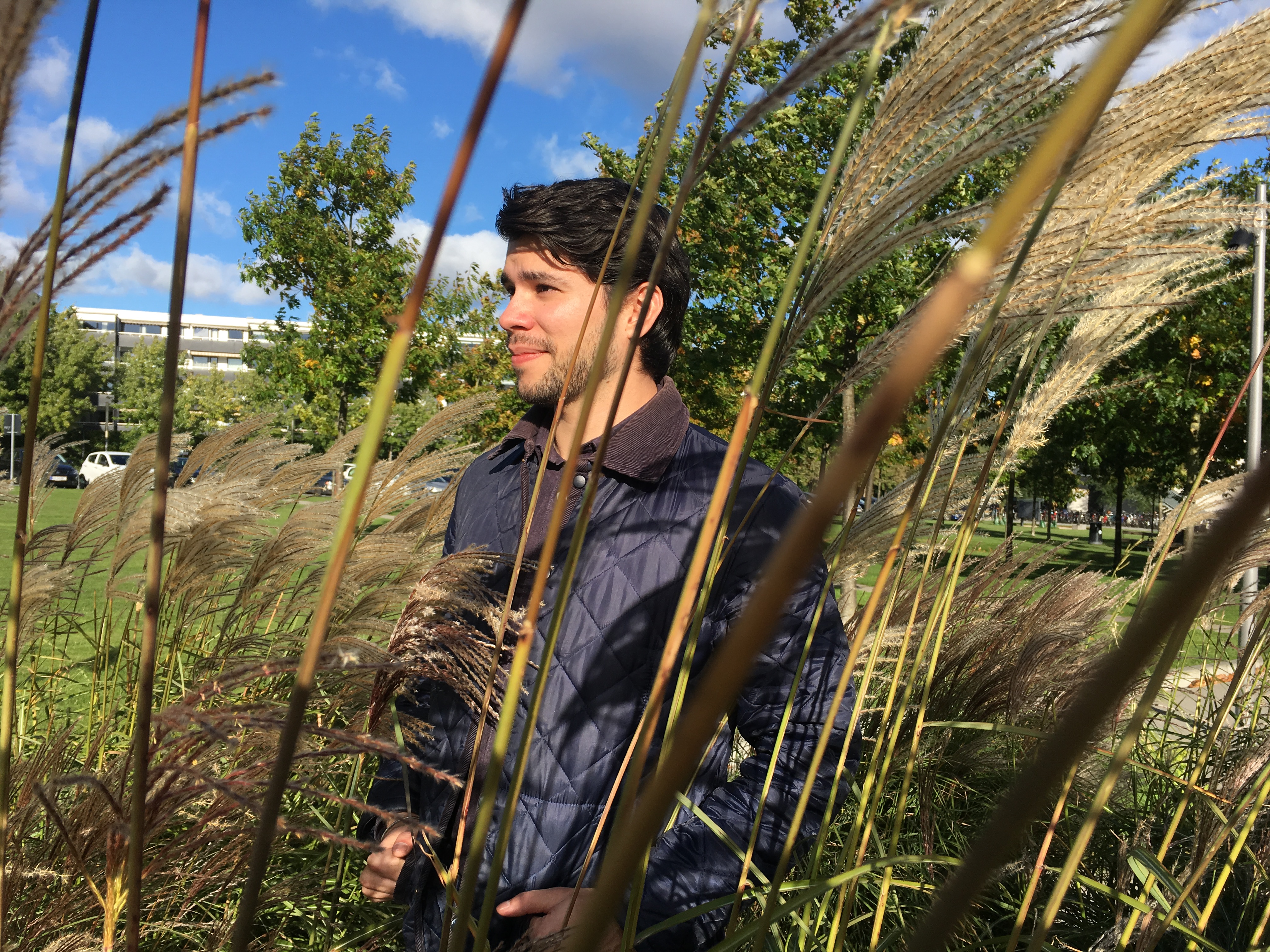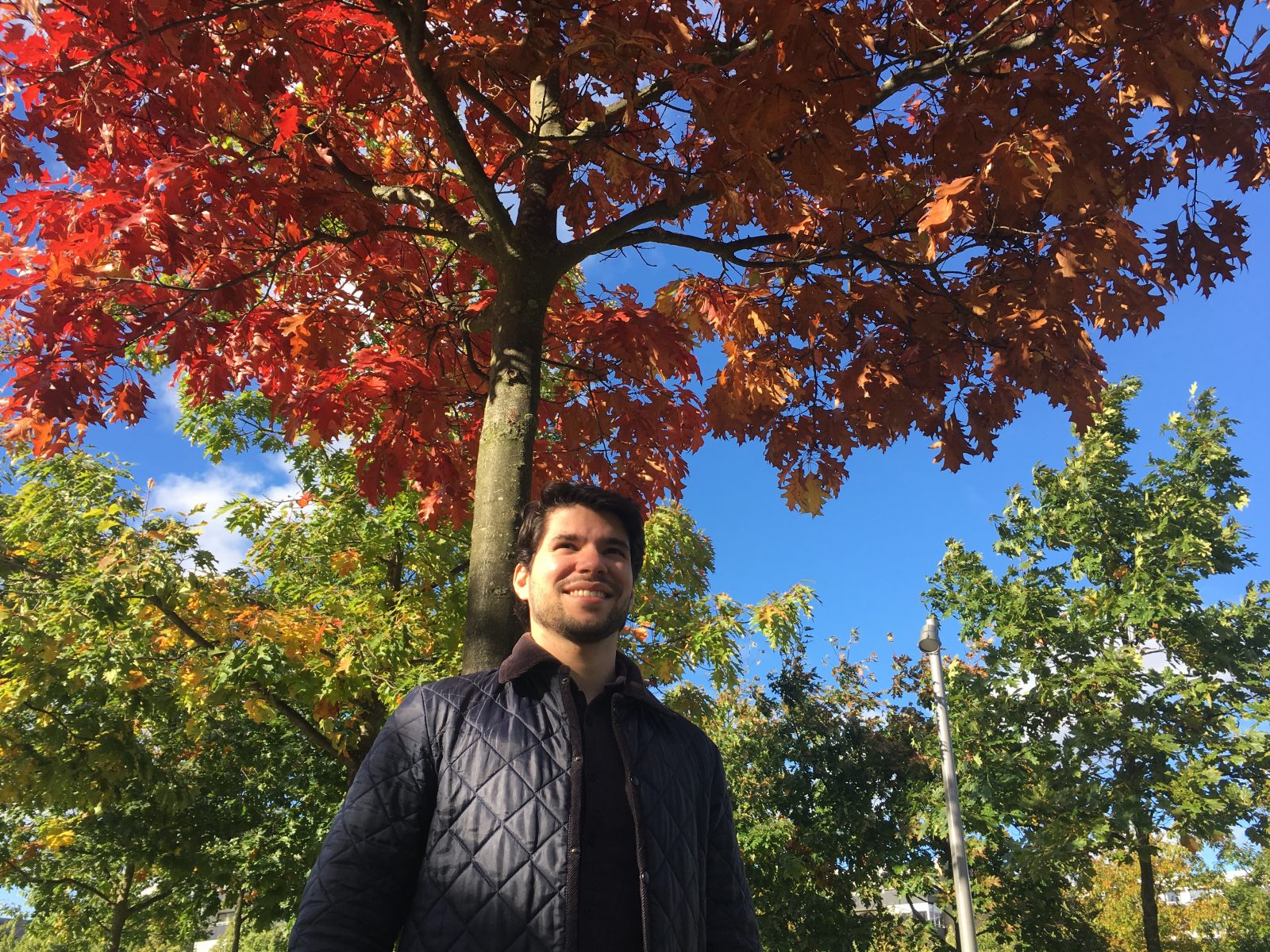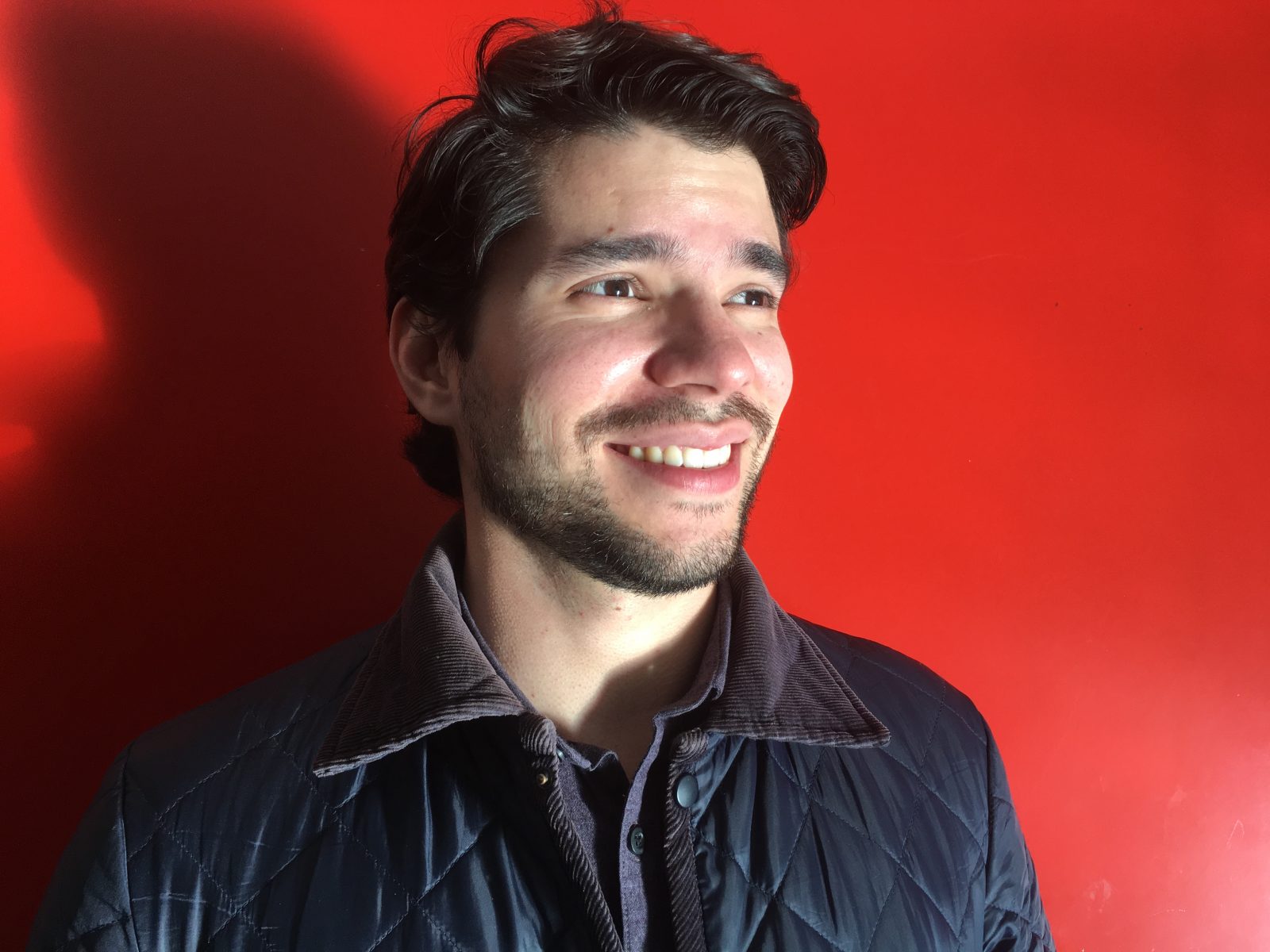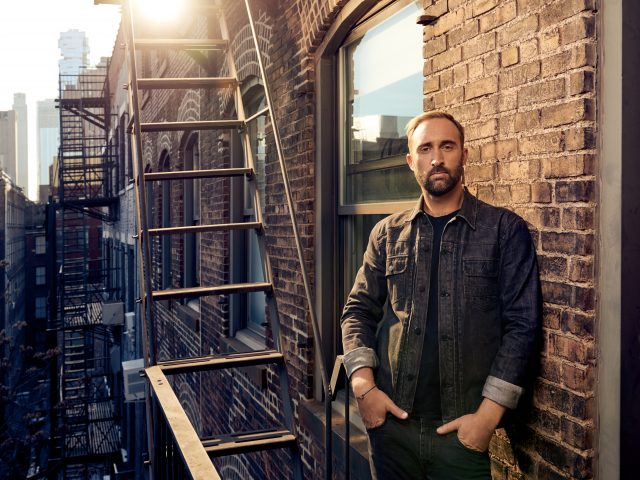Will Denmark kick out Gerardo again?

Gerardo José Lopez Rodriguez recently defended his thesis at CBS, but getting to that point has been a bit of hassle. (Photo: Anne M. Lykkegaard)
Newly graduated CBS student, Gerardo José Lopez Rodriguez, must be the Danish society’s dream international student. Hard working, fluently speaking in Danish, and paying for his whole education at CBS himself. Nonetheless, he was kicked out of Denmark in the fall of 2016 due to working 63,5 hours too much over the course of four months. Read the insane story of how Gerardo has fought his way back and tackled one obstacle after the other. Maybe he’ll get to stay for good this time?
Gerardo José Lopez Rodriguez from Venezuela is happy, as he recently defended his thesis in Diversity and Change Management at CBS. But it was a close call that he even got to finish his degree.
On the 2nd of October, 2016, one year into his master’s degree, Gerardo José Lopez Rodriguez had his student residents permit confiscated and was kicked out of Denmark.
Reason: he worked 63,5-hours overtime in the fall 2015.
Gerardo José Lopez Rodriguez has never received SU, has paid about DK 200,000 for his four semesters at CBS, and was told to have DKK 150,000 in his bank account before arriving to Denmark. So, to pay for his entire stay, he had to work. And since Gerardo José Lopez Rodriguez is such a nice guy, he couldn’t let his boss down whenever he asked him to work a little longer.
His student resident permit stated that he could work 20 hour per week – 87 hours a month. Apperantly, these numbers are not to be messed with. You can’t work 10 hours one week and 30 the other. This was the mistake Gerardo José Lopez Rodriguez made.
What I’ve learned is that this system is extremely rigid
Gerardo José Lopez Rodriguez
From September to December in 2015, he worked about three hours overtime every week – 63,5 hours – and this made the Danish Agency for International Recruitment and Integration contact him with an unexpected message in July 2016.
“I panicked. I didn’t understand the email from the Danish Agency for International Recruitment and Integration stating that I had to leave the country before 2nd October 2016, due to working overtime. I tried to talk to the people at the agency, but it was of no help. I also had to talk to CBS, as this could mean I would lose my place at CBS,” explains Gerardo José Lopez Rodriguez.
What comes next is about a year of uncertainty whether Gerardo José Lopez Rodriguez could return to Denmark and finish his degree, expenses for lawyers and permit applications running up to more than DKK 20,000, which his Danish girlfriend’s family helped out in paying, and traveling in and out of Denmark. (See timeline in the bottom.)
The football hero Michael Laudrup
The explanation for why Gerardo José Lopez Rodriguez chose to come to CBS and study in the first place lie years back.
In 2007, when he had finished high school in Venezuela, he wanted to go and see the world. At the time, Gerardo José Lopez Rodriguez was very dedicated to football, which was what brought him to Denmark. To be more specific, it was his fascination for the Danish footballer Michael Laudrup that was the main reason why Gerardo José Lopez Rodriguez had to come and pay a visit to Denmark.
“Naturally, I had to explore the country where Michael Laudrup is from,” says Gerardo José Lopez Rodriguez and says that he took part in an exchange program and was enrolled in a second-year high school class at Tørring Gymnasium in the small town of Tørring in Jutland.
“I didn’t understand much to begin with, but bit by bit I got a hang of Danish, which is why I speak it fluently today,” says Gerardo José Lopez Rodriguez.
When the year in Tørring came to an end, Gerardo José Lopez Rodriguez knew he wanted to come back to Denmark.
“Right after returning to Venezuela, I started to look into how I could go back and what I would like to study. I knew, it had to be related to business, so, naturally I chose CBS and planned my educational path to make it fit for a master’s degree there,” says Gerardo José Lopez Rodriguez, who did a bachelor degree in business administration.
Furthermore, he had to save up money to pay for the education which costs DKK 47,000 per semester – in total about DKK 200,000. He was also told that he had to document a bank account with the equivalent of DKK 150,000 before coming to Denmark. Non-EU residents have to be able to take care of themselves for about a year from the moment of their arrival. (See fact box)
“I sold everything I owned in Venezuela to save up enough money. But by the time I arrived to Denmark, they had changed the rules, so, I didn’t have to have as much money in my bank account as I originally thought. But then I just spent it on the education,” says Gerardo José Lopez Rodriguez.
Gerardo José Lopez Rodriguez left Venezuela in March, 2015 and came to Denmark to visit old friends and his host families from his stay in Tørring, before he began his studies in September.
Since Gerardo José Lopez Rodriguez is from Venezuela, he can’t receive SU, so, he got himself a night job as a porter at several hotels so that he would be able to pay for his stay in Denmark and his master’s degree. But it wasn’t until the end of 2015 that he started noticing that his resident permit might be in danger.
A thought-provoking article
In 2015, another international student called Marius Youbi from the Univeristy of Aarhus was kicked out of Denmark despite getting straight A’s. He had worked too much.
Gerardo José Lopez Rodriguez read one of the many articles about Marius Youbi’s fate and that got him thinking.
“I got to thinking that this could happen to me too, as I knew I might have been doing a little overtime. So, from 2016 and onwards I was very careful so that I didn’t work more than 20 hours a week,” he says.
As a part of Gerardo José Lopez Rodriguez’s study, he had to do an internship, and he was offered one at Siemens Windpower beginning in August, 2016. To get the final acceptance, Gerardo José Lopez Rodriguez sent in an application to the Danish Agency of International Recruitment and Integration in June in order to get a working permit.
This was when they found out Gerardo José Lopez Rodriguez had worked 63,5 hours too much in the fall of 2015. If you count his hours from September 2016 – May 2017, he has worked a total of 763 hours. But he is allowed to work 783 – if he had spread them out evenly.

“I contacted one of the best lawyers in these matters and he told me that it was going to be settled. That made me relax for a little while,” says Gerardo José Lopez Rodriguez.
But things didn’t settle. The lawyer sent a letter explaining the situation and asking the agency to undo the decision. They declined. Gerardo José Lopez Rodriguez had to annul his internship at Siemens and leave the country on the 2nd October 2016.
As a last resort, Gerardo José Lopez Rodriguez’s lawyer sent in an appeal to The Immigration Appeals Board.
Gerardo Gerardo José Lopez Rodriguez’s case was taken up in the press, and the President of CBS, Per Holten-Andersen went public about the case.
“It occurs to be unfair, that such a tiny breach of an otherwise complicated set of rules is to have a consequence this dramatic. It should be possible to find a solution right away for the people who get in a situation that is this difficult,” said Per Holten-Andersen to the Danish newspaper Politiken on the 27th September 2016.
Unexpected news
Gerardo José Lopez Rodriguez went to Panama, since Venezuela was in a state of emergency and he had friends in Panama who could get him a job. Upon leaving Denmark, he was promised that he could keep his place at CBS and take a few additional courses until things got settled. Meanwhile, he worked full time at a logistics company to earn enough money to pay for his education.
“It was exhausting as hell. And I did this for six months. The courses I took were ordinary courses, so, I had to complete them without going to any of the lecturers in order to keep my place at the university. Moreover, I had to apply for an exemption twice to be able to take the exams written instead of orally,” says Gerardo José Lopez Rodriguez.
I wouldn’t have come back if it wasn’t for Julie
Gerardo José Lopez Rodriguez
In March 2017, Gerardo José Lopez Rodriguez decided to go back to Denmark on a tourist visa and applied for a new student resident permit. Meanwhile, waiting for the permit to be processed, and due to the fact that he hadn’t yet heard anything from the Integration Appeals Board anbout the appeal, Gerardo José Lopez Rodriguez contacted a new lawyer to make sure he was doing things right.
The new lawyer immediately asked Gerardo José Lopez Rodriguez to cancel the appeal-case, as it would take way too much time and he might not get anything out of it in the end. So, said, then done. And then the lawyer told Gerardo José Lopez Rodriguez something quite surprising.
When Gerardo José Lopez Rodriguez was sent out of the country he and the first lawyer thought he had to leave Denmark and the Schengen area for at least six months – which was why he went to Panama.
But this wasn’t the case. When the new lawyer looked at Gerardo José Lopez Rodriguez’s case, he could see that he had only made a minimal breach of the rules, meaning that Gerardo José Lopez Rodriguez hadn’t recieved an entry prohibition, as people normally would when they are asked to leave the country. An entry prohibition can last between two to three years, or sometimes even longer.
“I didn’t have to stay in Panama for six months and then come back. I could have just left the Schengen area for three months and then come back. It could have saved me a lot of money if I had only known,” says Gerardo José Lopez Rodriguez.
He goes on to explain that he stayed in Panama this longonly because his first lawyer told him that he had to leave the country, and nobody from the Danish Agency for International Recruitment and Integration informed him that he could just leave Denmark for three months. Furthermore, Gerardo José Lopez Rodrigues was in doubt if his early return to Denmark would have some sort of consequence.
The new student resident permit lasted from June to July, 2017, which wasn’t nearly long enough to cover Gerardo José Lopez Rodriguez’s entire period of study. Because here’s another thing.

Gerardo José Lopez Rodriguez’s passport expired this year in October. And because of this, he couldn’t get a full student resident permit covering the last semester of his studies.
Gerardo José Lopez Rodriguez has asked for a new passport through the Venezuelan embassy in Denmark, but because Venezuela is having immense internal troubles, they haven’t been able to send it yet.
But Gerardo José Lopez Rodriguez is still here and has finished his degree since he can’t be sent out of the country while his application for the extension of the permit is being processed, and it will be so until Gerardo José Lopez Rodriguez gets his new passport.
And without a passport he can’t get a permit, and without a permit he can’t apply for any jobs.
What you do for love…
Gerardo José Lopez Rodriguez found his way back to Denmark and got to finish his degree at CBS this September. But it wouldn’t have been this way if it wasn’t for his girlfriend Julie Kold, who he met at CBS.
“When I got kicked out, I wouldn’t have come back if it wasn’t for Julie. She supported me in all this. She talked to CBS, the lawyers, the media, everyone. If I had to deal with this all by myself, I would have felt extremely powerless,” says Gerardo José Lopez Rodriguez and continues:
“This entire experience has been a little easier to handle, as everyone I talked to was supportive. No one said that I should just pack my things and leave.”
Gerardo José Lopez Rodriguez’s parents have supported him too and questioned the entire situation.
“My parents don’t understand why I was kicked out due to working too much. To them, it doesn’t make sense and it doesn’t to me either. Now, they are just happy that I got back to Denmark and finished my degree,” he says.
I’m still afraid I’m going to get kicked out
Gerardo José Lopez Rodriguez
“I want to stay in Denmark”
When Gerardo José Lopez Rodriguez gets his passport, he can start looking for a job. But he can’t take up just any job. As a newly graduate and non-EU citizen, he will have to earn DKK 408.000 a year – DKK 34.066 a month before taxes – until he becomes a Danish citizen.
One can think that it might not be worth coming back to Denmark since the rules are quite “rigid” as Gerardo José Lopez Rodriguez puts it. But to him, there’s a lot of reasons to work hard for Denmark.
“I want to stay in Denmark. I have my friends, my girlfriend, and my network here. It’s just incredibly unlucky that I had to go through all of this to get where I am today. What I’ve learned is that this system is extremely rigid and I want to advise all foreigners to make sure to look into the rules carefully upon arrival. You can lose everything by just doing two hours overtime,” he says.
The combination of the delayed passport and his previous experience has left Gerardo José Lopez Rodriguez a little worried about his situation.
“Even though things are about to settle, I’m still afraid I’m going to get kicked out. So, I’m extra careful about everything I do. I think I call the Danish Agency for International Recruitment and Integration on a weekly basis,” says Gerardo José Lopez Rodriguez.

































































































































Comments